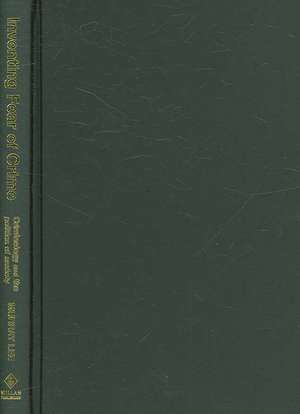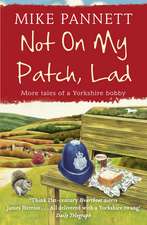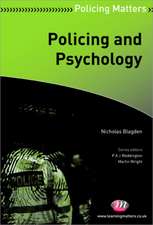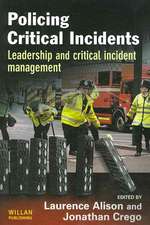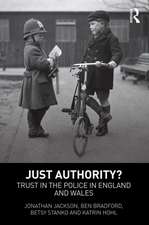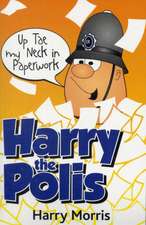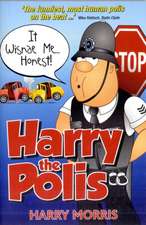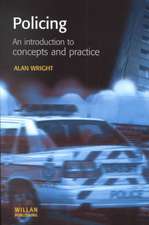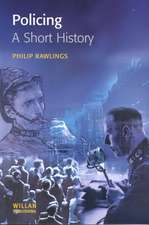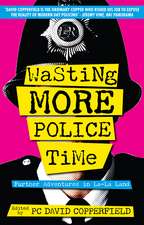Inventing Fear of Crime
Autor Murray Leeen Limba Engleză Hardback – 2007
Despite this activity, actually reducing levels of fear of crime has proved difficult. Even in recent years when many western nations have experienced reductions in the levels of reported crime, fear of crime has often proven intractable. The result has been the development of what amounts to a fear of crime industry. Previous studies have identified conceptual challenges, theoretical cul-de-sacs and methodological problems with the use of the concept fear of crime. Yet it has endured as both an organizing principal for a body of research and a term to describe a social malady. This provocative, wide ranging book asks how and why fear of crime retains this cultural, political and social scientific currency despite concerted criticism of its utility? It subjects the concept to rigorous critical scrutiny taking examples from the UK, North America and Australia.
Part One of Inventing Fear of Crime traces the historical emergence of the fear of crime concept, while Part Two addresses the issue of fear of crime and political rationality, and analyses fear of crime as a tactic or technique of government. This book will be essential reading on one of the key issues in government and politics in contemporary society.
| Toate formatele și edițiile | Preț | Express |
|---|---|---|
| Paperback (1) | 485.46 lei 6-8 săpt. | |
| Taylor & Francis – 2007 | 485.46 lei 6-8 săpt. | |
| Hardback (1) | 1006.43 lei 6-8 săpt. | |
| Taylor & Francis – 2007 | 1006.43 lei 6-8 săpt. |
Preț: 1006.43 lei
Preț vechi: 1227.35 lei
-18% Nou
Puncte Express: 1510
Preț estimativ în valută:
192.59€ • 205.94$ • 160.57£
192.59€ • 205.94$ • 160.57£
Carte tipărită la comandă
Livrare economică 17 aprilie-01 mai
Preluare comenzi: 021 569.72.76
Specificații
ISBN-13: 9781843921752
ISBN-10: 1843921758
Pagini: 256
Dimensiuni: 156 x 234 x 16 mm
Greutate: 0.63 kg
Ediția:1
Editura: Taylor & Francis
Colecția Willan
Locul publicării:Oxford, United Kingdom
ISBN-10: 1843921758
Pagini: 256
Dimensiuni: 156 x 234 x 16 mm
Greutate: 0.63 kg
Ediția:1
Editura: Taylor & Francis
Colecția Willan
Locul publicării:Oxford, United Kingdom
Cuprins
1. Introduction 2. Fear of crime: a pre-history 3. Anxieties in the knowledgeable society: the birth of a new criminological object 4. Surveying the fearful: the expansion of the victim survey 5. Fearing subjects 6. Governing and policing the fearful 7. The marketing of monsters 8. Conclusions: don't mention the 'F' word
Notă biografică
Murray Lee is a Director of the Sydney institute of Criminology and a Senior Lecturer in Criminology. He is the author of Inventing Fear of Crime: Criminology and the Politics of Anxiety and co-author of Fear of Crime: Critical Voices in and Age of Anxiety. His current research interests involve the spatial distribution and dynamics of crime and criminalisation in South Western Sydney, crime and social isolation, and fear of crime.
Recenzii
'Murray Lee's work on the fear of crime is tremendously important; it cannot be ignored by anyone wishing to seriously pursue this most slippery and politically-charged of concepts. This book does a wonderful job of locating the fear of crime in the wider social and political contexts. In so doing, Lee touches on a number of important areas of contemporary criminological concerns (CCTV, private security and risk to mention but three of them). This book deserves to be widely read - I am sure that it will be.' − Stephen Farrall, University of Sheffield
'It was Thomas Hobbes that identified the potency of fear as a source of political motivation. Fear has once again returned to the centre of our public life and everyday experience in late modernity. 'Our citizens have the right to live without fear' intone political leaders. But supplying the knowledge, advice, services and products that support the fear industry - exploring, measuring, engendering, tempering, assuaging everyday fears - is now an endeavour joined by a range of agents from the market, voluntary, academic and government sectors. A sparkling intellectual genealogy of the relentlessly proliferating discourses around fear of crime, Lee's book provides a fresh way of viewing the concept that has spawned this industry and which in a short time has managed to become a staple of criminological knowledge and crime policy. He shows how fear has become a new object of knowledge and a new device of rule for governments, communities, households and individuals. Governed through fear, citizens as consumers are exhorted to the responsible self-management of their insecurities, communities are united on the back of little more than shared anxieties and states seek to renew their legitimacy in terms of security. Lee however also demonstrates the unruliness of this new object as new programmes for knowing and managing fear serve to foment the very thing which they seek to control. This book will be of particular interest to criminologists but should attract the attention of many others inside and outside the academy. It will change the way we think about fear of crime.' − Russell Hogg, University of New England
'It was Thomas Hobbes that identified the potency of fear as a source of political motivation. Fear has once again returned to the centre of our public life and everyday experience in late modernity. 'Our citizens have the right to live without fear' intone political leaders. But supplying the knowledge, advice, services and products that support the fear industry - exploring, measuring, engendering, tempering, assuaging everyday fears - is now an endeavour joined by a range of agents from the market, voluntary, academic and government sectors. A sparkling intellectual genealogy of the relentlessly proliferating discourses around fear of crime, Lee's book provides a fresh way of viewing the concept that has spawned this industry and which in a short time has managed to become a staple of criminological knowledge and crime policy. He shows how fear has become a new object of knowledge and a new device of rule for governments, communities, households and individuals. Governed through fear, citizens as consumers are exhorted to the responsible self-management of their insecurities, communities are united on the back of little more than shared anxieties and states seek to renew their legitimacy in terms of security. Lee however also demonstrates the unruliness of this new object as new programmes for knowing and managing fear serve to foment the very thing which they seek to control. This book will be of particular interest to criminologists but should attract the attention of many others inside and outside the academy. It will change the way we think about fear of crime.' − Russell Hogg, University of New England
Descriere
As fear of crime has grown in society, it has become of increasing concern for criminologists, policy makers, politicians, police and the media. This book traces the historical emergence of the fear of crime concept, addresses the issue of fear of crime and political rationality, and analyses fear of crime as a tactic or technique of government. It is essential reading on one of the key issues in government and politics in contemporary society.
